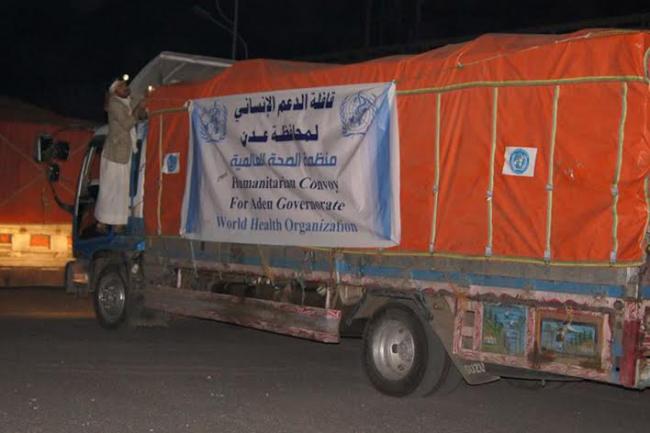15 Jul 2015, 07:06 am Print

“The humanitarian and health situation in Yemen continues to deteriorate, but the health situation is especially critical in Aden, with many people no longer having direct access to food, fuel, medical care and safe drinking-water,” said Dr. Ahmed Shadoul, WHO representative in Yemen.
The life-saving health supplies, which were part of a larger UN convoy, contained 46.4 metric tonnes of medicines, medical supplies, and water and sanitation supplies for more than 84, 000 beneficiaries in eight districts of Aden governorate, WHO explains in a press release.
Following a surge in the number of suspected cases of malaria and dengue fever since the start of the crisis, most significantly in Aden, WHO said it has also conducted rapid testing for dengue fever and malaria and provided support to a hospital in Aden to resume functionality of its fever/dengue ward and trauma management centre.
In addition, stressed WHO, Yemeni health professionals were trained by the Organization’s experts on epidemiological field investigations and early warning system surveillance.
To date, WHO has distributed a total of more than 175 metric tonnes of medicines and medical supplies and more than 500,000 litres of fuel to maintain the functionality of main hospitals, vaccine stores, ambulances, national laboratories, kidney and oncology centres, and health centres in 13 governorates, reaching a total of almost five million people, including 700,000 internally displaced persons and 140,000 children under the age of five.
The total civilian death toll since 26 March in Yemen is 1,670 and another 3,829 people were injured during this period.
On one particularly deadly day, 6 July, two markets in different provinces were hit by airstrikes. Forty civilians, including 12 children and seven women, were killed in the first airstrike, while 17 other civilians were injured.
During the bi-weekly press briefing today in Geneva, Johannes van der Klaauw, the representative in Yemen of the Office of the UN High Commissioner for Refugees (UNHCR), today recalled that this country is impacted by one of the largest humanitarian crises in the world, four out of five Yemenis being in need of some kind of assistance, which amounts to 21 out of 25 million people.
A party to international instruments for the protection of refugees, Yemen has currently a population of 250,000 refugees, mostly Somalis, who are among the most vulnerable to the current war situation, emphasized Johannes.
Meanwhile, UNHCR also reports that some 10,500 people have arrived in Yemen by sea sinceMarch 26 – bringing to over 37,000 the total so far this year, among them Ethiopians, Somalis and others.
Many have been tricked into making the crossing by smugglers who told them the conflict in Yemen is over, said the agency, adding that those making the sea crossings faced the usual risks of such journeys – abduction, attacks, drowning, exploitation and sexual assault.
To discourage crossings, he said mass information campaigns were now planned for Puntland and Somaliland and other points of departure, said Johannes.
Photo: WHO Yemen/S. Al-Wesabi
- New hybrid Mpox strain surfaces in UK and India — WHO sounds global alert
- Deadly weight: Obesity now responsible for 1 in 10 infection deaths worldwide
- Coffee and tea: This everyday drink may help protect your brain from dementia
- Happy Chocolate Day! The sweet secret behind chocolate’s hidden benefits
- Cambridge study finds menopause affects memory, mood, and sleep





-1763561110.jpg)
